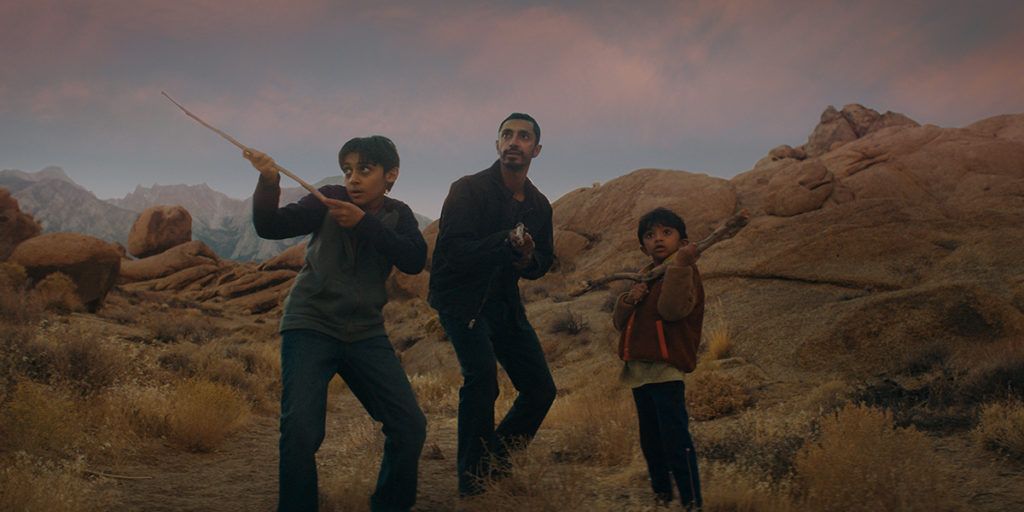Encounter

Image courtesy TIFF.
One of the most exhausted tropes in filmmaking is the last-minute twist that makes you realize that the unwell man doing harm to his family and himself wasn’t suffering from delusions after all. These movies often exploit mental illness for some kind of supernatural twist. Perhaps cognizant of the numerous times that writer/director M. Night Shyamalan mischaracterized mental illnesses (schizophrenia, dissociative identity disorder), writer/director Michael Pearce dodges this complication in the first act.
Convinced that aliens have come to Earth in parasitic form transmitted via insect carriers, Malik Khan (Riz Ahmed), a Marine Special Operations veteran, absconds with his two sons, Jay (Lucian-River Chauhan) and Bobby (Aditya Geddada) from his ex-wife’s house. For two years he’s been away on a secret mission, or so he tells them. It could be the truth or just the sort of thing a dad tells his boys so they don’t worry.
“We’re going on a special operations roadtrip. There’s no bedtimes. If you follow the rules I’ll let you find my gun. I don’t want you talkin’ to anybody out here,” he instructs Jay and Bobby. This immediately raises our suspicions.
Malik’s erratic behavior—weaving through traffic, telling the kids to keep their heads down as a police cruiser passes them on the highway—casts doubt on his story. But the preceding title sequence with its complex visuals and scenes of Ahmed preparing for what seems like post-apocalyptic battle sells us strongly on the idea that society, and not his mind, is in disarray.
As his kids rifle through his belongings, finding materials he’s been studying on his supposed missions, the three drive across California. A map with Malik’s handwriting shows a location near Groom Lake simply marked “Base”. Groom Lake, for the uninitiated in the lore, is the site of the fabled Area 51—as it’s called by so-called UFOlogists. At one point in the film, the trio stopped by a police officer in a situation that escalates the plot. The interaction confirms at least the likelihood that Malik indeed served in the military. Also, approached at gunpoint for not having hazard lights on, we see how profiling justifies some of Malik’s paranoia.
On the heels of a lauded turn in SOUND OF METAL, in limited release last year after premiering in Toronto in 2019, Ahmed’s despondent Malik turns the old trope on its side. Even as details emerge about a parole violation, a dishonorable discharge, playing off a Southern accent which, in film vernacular usually corresponds with the stereotype of the corn-fed, alien abductee, we still catch glimpses of cockroaches in dark corners. I don’t know if you’ve ever lived in an infested apartment, but once you’ve seen a few of them scurrying around, you start seeing them everywhere. The movie effectively plays on our own phobias just enough to keep us wondering.
While we’re wondering, however, Ahmed and his child costars deliver a nuanced story about a family riven by their father’s struggles with PTSD. Octavia Spencer supports the story as a parole officer sympathetic to Malik’s circumstnces, who tries to keep trigger-happy FBI agents at bay. The film meanders into a subplot reliant on a questionable lack of situational awareness a Special Forces Marine shouldn’t have, as well as some predictable THELMA AND LOUISE stylistic callbacks. Yet the denouement grounds itself in a connection bolstered by Ahmed’s and Chauhan’s performances.
Malik says he’s served ten tours in Afghanistan. Most Vietnam veterans served one to two tours, three at most. As one of the longest conflicts in U.S. military history draws to a close, we are left with many damaged by the horrors of war. It just doesn’t feel right to celebrate or dismiss the damaged soldier. What he needs is neither ridicule nor revelry, but help.